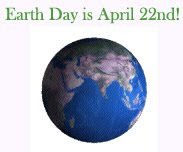This is my most recent article for NacNak, a great new paper that's spreading throughout the country, for which I write a column:
Earth Day, while still a relatively new holiday for many, is actually celebrating its 40th anniversary this year! It’s officially on April 22nd, but many cities, like Nashville, are celebrating it with an Earth Day Festival this Saturday, the 17th.
Whether you credit the media, Al Gore, the weird temperature fluctuations we undeniably experience these days, or this highly-informative, incredibly entertaining column you’re currently reading, you’re probably more aware today, than ever before, about the need to green your world. (Green, heretofore a humble color, -- a mere adjective -- has now branched out and become a verb.)
Whether by recycling your OJ bottles, taking your own tumbler /thermos to the coffee shop, carpooling one day a week, turning off the water while you’re brushing your teeth, or, if your organization uses promotional items (which every organization should, but more on that later), switching to more environmentally-friendly versions: recycled-paper pens, rather than plastic; recycled business card magnets, recyclable custom bags, organic cotton apparel – it all counts! It all matters.
Andrea, from Vanderbilt, who just ordered embroidered shirts from us, insisted on not just organic cotton t-shirts and polos, but certified organic cotton/made-in-the-USA t-shirts. She would not accept anything less (which I thought was awesome!). Andrea knows that organic cotton is grown using natural fertilizers (Ah, the wonders of cow poo) and is free from toxic chemicals. Instead of using herbicides to kill weeds, organic cotton farmers use hoes. Instead of using pesticides to kill plant-eating pests, they use things like chili and garlic (and every bug I know hates that stuff!). Plus, a field must be pesticide-free for at least three years before it can be certified organic. Conventional Cotton, on the other hand, uses pesticides that are known carcinogens that affect the air, ground, water, and food supply. For instance, Aldicarb, a nerve agent, originally developed during WWII, is one of the most toxic pesticides applied to conventional cotton. According to the Environmental Justice Foundation, just one drop of Aldicarb, absorbed through the skin, is enough to kill one adult. Another one, monocrotophos, while pulled from the US market in 1989, is still widely used in developing countries, and has been directly linked, not only to cancer, but to paralysis in children living in cotton growing areas, such as Paraguay. (Andrea’s reasons for wanting made-in-the-USA shirts, goes without saying.)
Environmental awareness is key. Tuning in to what’s genuinely happening is vital to the future of our children, and our children’s children.
Now, Earth Day, created to heighten that awareness, came about in 1970 (though the idea for it had been germinating for roughly eight years), as a result of the efforts of Senator Gaylord Nelson. While he was successful in persuading President Kennedy to go on a National Conservation Tour to promote environmental awareness and conservationism, for one reason or another, the tour did not succeed in putting the issues on the national agenda.
Not to be outdone, Senator Nelson, inspired by anti-Vietnam War demonstrations (“teach-ins”), proceeded to organize a huge grassroots protest, on behalf of the environment. 20 million demonstrators took part, along with thousands of schools and communities. And here we are, 40 years later, carrying on his message.
Celebrate Earth Day by turning over a new leaf. Or planting a tree. Or putting something in the recycling bin, rather than the trash can. If you’re in or near Nashville, be sure and come to the Earth Day Festival at Centennial Park. I’ll be in the Eco-Swag™ booth! (No autographs, please!) Bring this article, and get a free gift!)





